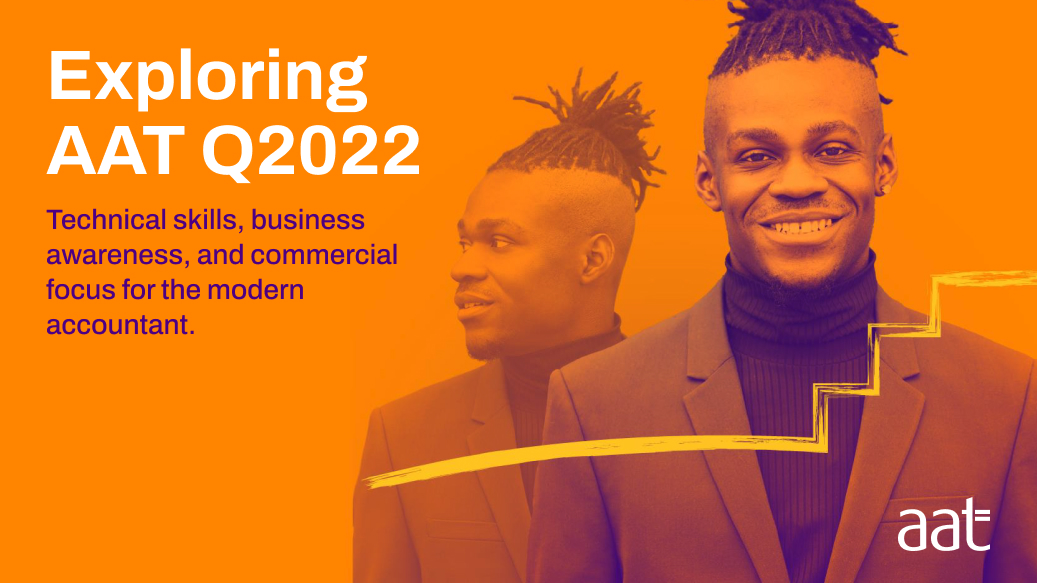What's new with AAT?
The AAT (Association of Accounting Technicians) has made the biggest syllabus update in over two decades, introducing four new themes across their programmes including:
- Technology
- Communication
- Ethics
- Sustainability
These changes will be seen across both the England (levels 2 to 4) and Scotland (5 to 7) programmes.
Keep reading to find out why the changes are being made, what the changes will be, and how it will impact learners and businesses.
Why are the AAT syllabus changes being made?
The pandemic has revolutionised the way that people operate, with remote working, new technologies, and automation of activities becoming a prominent factor within the professional environment. As a result, the average Accountant role has become much broader, with analytical skills, commercial awareness, and business partnering representing key responsibilities within an organisation.
To meet these changing skill sets, the 2022 version of the AAT qualifications will feature themes including technology, communication, ethics, and sustainability, to provide learners – and by extension their organisations – with the skills and behaviours the need to thrive, whilst also being conscious of their environmental impact.
Some of the units from the old syllabus have now been combined to make the qualification more relatable to the learner, meaning that the topics can be applied to real-life scenarios, allowing learners to see the full picture of accounting processes and immediately understand how to apply their learning.
What do the AAT syllabus changes mean for students who have enrolled on affected programmes?
The new and improved AAT syllabus now reflects the real working environment, using applied learning to create a vast skills toolset, which will help learners as they progress in their accounting role. In addition, it acknowledges and addresses the need to develop not just technical experts, but rounded individuals who are competent and confident in their roles.
In line with these changes, Babington has updated all relevant courses with the new syllabus – whilst keeping the learner experience front and centre. We have ensured that the new content contextualises each topic that is being taught for maximum understanding; leveraged blended delivery that mixes online and offline formats; as well as providing supporting tailored support, from entry level right through to more senior levels.
For current learners, the new content will not be vastly different from the old syllabus, all levels will have fewer assessments as part of the qualification. Keep reading to find out what the changes are, across all the programmes:
Scotland:
- AAT Foundation Certificate in Accounting SCQF Level 5 will now be level 6 instead. The assessments have been reduced from 5 to 4 units. Learner outcomes and journey themes have been updated in accordance with the reduced number of assessments – this simply means that some content has been removed from the syllabus to avoid repetition later down the line, as the learner completes each programme.
- AAT Advanced Diploma in Accounting SCQF Level 6 will now be level 7 instead. The assessments have been reduced to 4 from 6 units. This is so repetition can be avoided as they complete the various levels.
- AAT Professional Diploma in Accounting SCQF Level 8 has stayed the same. The number of assessments has been reduced to 5 from 6. Like mentioned before, some content has been removed to avoid repeating content from lower levels.
England:
- Assistant Accountant Level 3 AAT has stayed the same. The number of assessments has been reduced to 4 from 6. Whilst there is still a synoptic assessment at the end of the programme, some content has been removed to avoid repeating the topics later, as the learner progresses through the levels.
- Professional Accounting Technician Level 4 CIMA ACCA AAT has stayed the same. The number of assessments has been reduced to 8 from 9. Whilst there is still a synoptic assessment at the end of the programme, some content has been removed to avoid repeating the topics from the lower levels.
Professional Qualifications:
- AAT Certificate in Bookkeeping – Level 2 has stayed the same. The number of units is the same too, with learner outcomes to be reflected the same as the Scotland version (Bookkeeping only reflects the first 2 units: Introduction to bookkeeping and principles of bookkeeping). The guided learning hours has also increased to 115 hours from 105 hours.
- AAT Certificate in Accounting – Level 2 has stayed the same. The assessments have been reduced from 5 to 4 units, with ‘Using Accounting Software’ being removed from the programme and a new module being added called ‘The Business Environment’. The reason for reducing the units is to avoid repetition of content later down the line, as the learner works upwards through the levels.
- AAT Diploma in Accounting – Level 3 has stayed the same. The assessments have been reduced from 5 to 4 units, as the synoptic assessment has been removed from this programme and two former modules have been combined to create ‘Financial Accounting: Preparing Financial Statements’. In addition, a new unit has been added to the programme called ‘Business Awareness’. Learner outcomes to be reflected the same as Scotland. The guided learning has been increased by 10 hours (from 390 hours to 400 hours).
- AAT Diploma in Professional Accounting – Level 4 has stayed the same. The assessments have been reduced from 9 to 8 units. The synoptic assessment has been removed from this programme as well as former modules ‘Budgeting’ and ‘Decision & Control’, which has now been combined to create a new unit called ‘Applied Management Accounting’. The learner outcomes are to be reflected the same as Scotland. In addition, the guided learning hours has been decreased by 30 hours (from 600 hours to 570 hours).
Want to know more about the AAT syllabus changes? Watch our on-demand session about the changes below, featuring representatives from the AAT, Babington, and Grant Thornton UK LLP:

